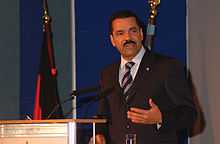Ronald Noble
| Ronald Noble | |
|---|---|
 | |
| Secretary-General of the International Criminal Police Organization (INTERPOL) | |
| In office 2000–2014 | |
| President | Mireille Balestrazzi |
| Preceded by | Raymond Kendall |
| Succeeded by | Jürgen Stock |
| Personal details | |
| Born | 1956 Fort Dix, New Jersey, U.S. |
| Alma mater | University of New Hampshire Stanford Law School |
Ronald Kenneth Noble (born 1956, at Fort Dix, New Jersey) is an American law enforcement officer, and a former Secretary-General of Interpol.
Academic career
He is a 1979 graduate of the University of New Hampshire[1] with a bachelor's degree in economics and business administration in the Whittemore School of Business and Economics, and also a 1982 graduate of Stanford Law School. Noble also is a tenured professor at the New York University School of Law, on leave of absence while serving at Interpol.
Law career
From 1993 until 1996 he was the Undersecretary for Enforcement of the United States Department of the Treasury, where he was in charge of the United States Secret Service, the Bureau of Alcohol, Tobacco, and Firearms,the U.S. Customs Service Office of Enforcement, the Federal Law Enforcement Training Center, the Office of Foreign Assets Control, and the Financial Crimes Enforcement Network.[2] He was head of the Department's "Waco Administrative Review Team" which produced a report on the ATF's actions against the Branch Davidians leading to the Waco Siege.[3]
He was elected the first American Secretary General by the 69th Interpol General Assembly in Rhodes, Greece, in 2000, was unanimously re-elected to a second five-year term by the 74th Interpol General Assembly in Berlin, Germany, in 2005 and was unanimously re-elected to a third five-year term by the 79th INTERPOL General Assembly in Doha, Qatar, in 2010. Interpol is the largest international police organization serving 188 countries with a current budget of $72.2 million for 2008.[4]
Under Secretary-General Noble's leadership, Interpol developed the world's first global database of stolen or lost travel documents (i.e., passports) from more than 120 countries and the first global police communications system, called I-24/7 as part of its international screening process for terrorists and dangerous criminals.
He supervised the creation of the world's first international automated DNA database and another automated database aimed at fighting the sexual exploitation of children on the Internet.
Belarus metro bombing controversy
On 11 April 2011, a bomb exploded in the Minsk Metro, killing 15 people. On 13 April, Belarus President Alexander Lukashenko, dubbed "the last dictator in Europe" by Condoleezza Rice, announced that Dmitry Konovalov, 25, and Vladislav Kovalyov, 25, had been captured by the KGB, confessed and would be executed by firing squad. Noble travelled to Minsk in May 2011 and congratulated the investigators for their "high professionalism" in solving the case in such a short time period, despite their trial not having taken place. Kovalyov's mother, Lyubov Kovalyova, has since been campaigning for their case to be reinvestigated. She claims that the pair were tortured into confessing.
BBC journalist John Sweeney has questioned the fairness of the trial and has criticised Noble for endorsing the KGB's investigation, as has co-founder of the Belarus Free Theatre, Natalia Koliada. A spokesperson for Interpol told the BBC: "Ronald K. Noble, Interpol Secretary-General concluded that the Belarusian criminal investigation was professionally conducted and that the arrests of Dmitry Konovalov and Vladislav Kovalev solved the case of who was criminally responsible for the bombing. Secretary General Noble stands by that statement today. […] Advancing one-sided false claims about murderous terrorist conduct can only undermine public confidence in the media."[5]
Awards
In 2008, he was awarded the Légion d'honneur by French President Nicolas Sarkozy.[6]
Personal information
Noble speaks French, German, and Spanish, as well as his native English.
References
- ↑ "Secretary General of INTERPOL, Ron Noble Gave Keynote At UNH Law Conference Feb. 19 : UNH Alum Ronald K. Noble Among Experts Featured at Counterfeit Pharmaceuticals Symposium". University of New Hampshire. February 8, 2014. Retrieved December 20, 2014.
- ↑ INTERPOL biography of Ronald Kenneth Noble, INTERPOL Secretary General.
- ↑ Wikisource: Report of the Department of the Treasury on the Bureau of Alcohol, Tobacco, and Firearms Investigation of Vernon Wayne Howell Also Known as David Koresh September 1993/Memo
- ↑ Hutson, Brittany (December 2008). "The Enforcer". Black Enterprise (New York). p. 114.
- ↑ Sweeney, John (30 July 2012). "Belarus: Were executed Minsk metro bombers framed?". BBC News. Retrieved 9 November 2011.
- ↑ Ronald K. Noble, INTERPOL Secretary General biography, Last modified on 7 October 2008
| Government offices | ||
|---|---|---|
| Preceded by Raymond Kendall |
Secretary-General of the International Criminal Police Organization (INTERPOL) 2000–2014 |
Succeeded by Jürgen Stock |